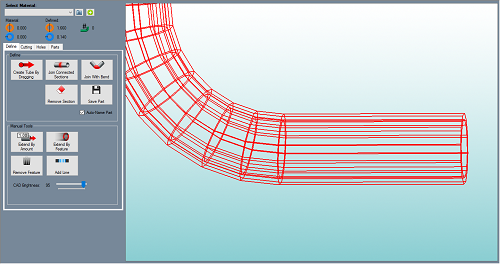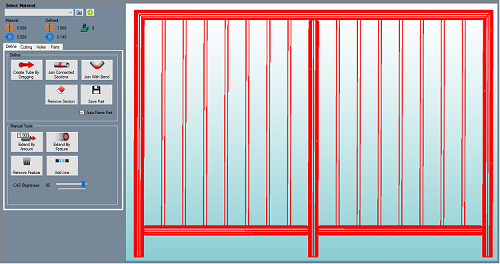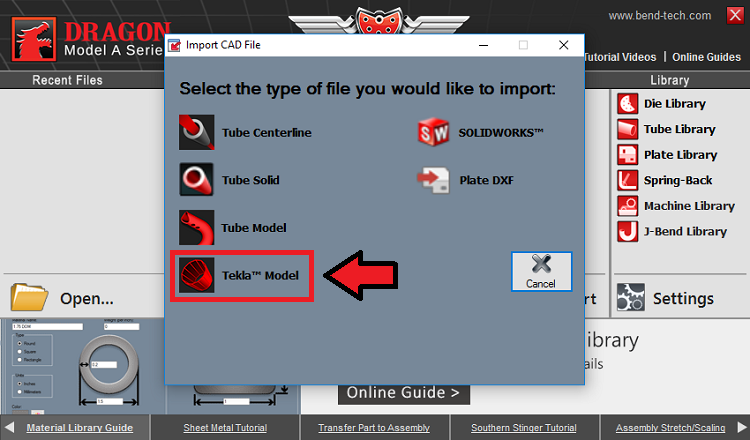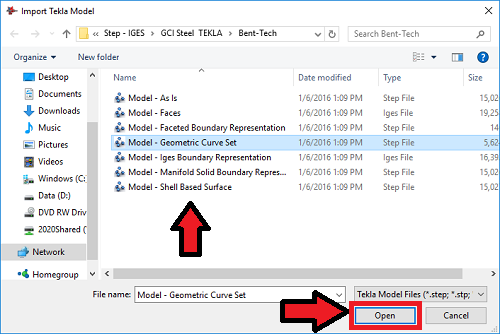Difference between revisions of "Tekla Import Guide"
(→Define Section) |
|||
| Line 54: | Line 54: | ||
[[File:Tekla_Remove_Section1.png]] | [[File:Tekla_Remove_Section1.png]] | ||
| + | |||
| + | ====Save Part:==== | ||
| + | Click the '''Save Part''' [[File:Save_Part_Tekla1.png]] button when a single part has been fully defined and it will be saved to the '''Parts''' tab and it will be ready to transfer to another designer. | ||
Revision as of 13:33, 10 May 2016
Bend-Tech's Tekla importer is useful for customers with .step and .iges file types that contain a boundary representation of the tube model. These file types are exported from the Tekla software programs. Examples are illustrated in the pictures below.
Contents
Tekla Import Access
- To access the Tekla Model Importer, select the CAD Import Menu
 from the Task Menu and select the Tekla Model
from the Task Menu and select the Tekla Model  option from the list.
option from the list.
Open a Project
- Select a file from the list and click the Open button to open it in the Tekla Import screen.
Material Definition
1. The Select Material: drop down menu will be grayed out until the user has fully tracked the imported part. Once the part is tracked, it will need to be assigned a material which matches its Defined: outer diameter and wall thickness.
2. If a material is not set up in your material library that will match the imported part, clicking the Plus: ![]() button will add the imported material for you and assign it to the current part or project.
button will add the imported material for you and assign it to the current part or project.
3. The Material: section will show which material is chosen from the Select Material: drop down menu above. The Outside Diameter (OD) of the material will be shown next to the orange icon and the Material Wall Thickness will be shown next to the blue icon.
4. The Defined: section will show which material is applied to the part after importing. The detected Outside Diameter (OD) of the material will be shown next to the orange icon and the detected Material Wall Thickness will be shown next to the blue icon.
5. The number of bends detected in the part will be shown next to this icon.
Define
Define Section
Create Tube By Dragging:
Click the Create Tube By Dragging  button, then click and drag your cursor of your mouse over any straight section of tubing that you'd like to define. IMPORTANT: This works best if you refrain from including bends, zoom in close to your intended tube, and drag the line in a direction that runs opposite of the length of tubing you are trying to define. See the illustration below for more detail.
button, then click and drag your cursor of your mouse over any straight section of tubing that you'd like to define. IMPORTANT: This works best if you refrain from including bends, zoom in close to your intended tube, and drag the line in a direction that runs opposite of the length of tubing you are trying to define. See the illustration below for more detail.
Join Connected Sections:
Click the Join Connected Sections  button, then select a straight length of defined tubing followed by an adjoining straight length of defined tubing. You will always have to click the center line of the defined straight in order to select it. The tube will highlight red to indicate that it is ready to be selected. See the illustration below for more detail.
button, then select a straight length of defined tubing followed by an adjoining straight length of defined tubing. You will always have to click the center line of the defined straight in order to select it. The tube will highlight red to indicate that it is ready to be selected. See the illustration below for more detail.
Join With Bend:
Click the Join With Bend  button, then select a straight length of defined tubing followed by an adjoining straight length of defined tubing that is separated by a bend. You will always have to click the center line of the defined straight in order to select it. The tube will highlight red to indicate that it is ready to be selected. See the illustration below for more detail.
button, then select a straight length of defined tubing followed by an adjoining straight length of defined tubing that is separated by a bend. You will always have to click the center line of the defined straight in order to select it. The tube will highlight red to indicate that it is ready to be selected. See the illustration below for more detail.
Remove Section:
Click the Remove Section  button, then a straight or bent section of defined tubing in order to take away the definition for that section. You will always have to click the center line of the defined straight in order to select it. The tube will highlight red to indicate that it is ready to be selected. See the illustration below for more detail.
button, then a straight or bent section of defined tubing in order to take away the definition for that section. You will always have to click the center line of the defined straight in order to select it. The tube will highlight red to indicate that it is ready to be selected. See the illustration below for more detail.
Save Part:
Click the Save Part  button when a single part has been fully defined and it will be saved to the Parts tab and it will be ready to transfer to another designer.
button when a single part has been fully defined and it will be saved to the Parts tab and it will be ready to transfer to another designer.










